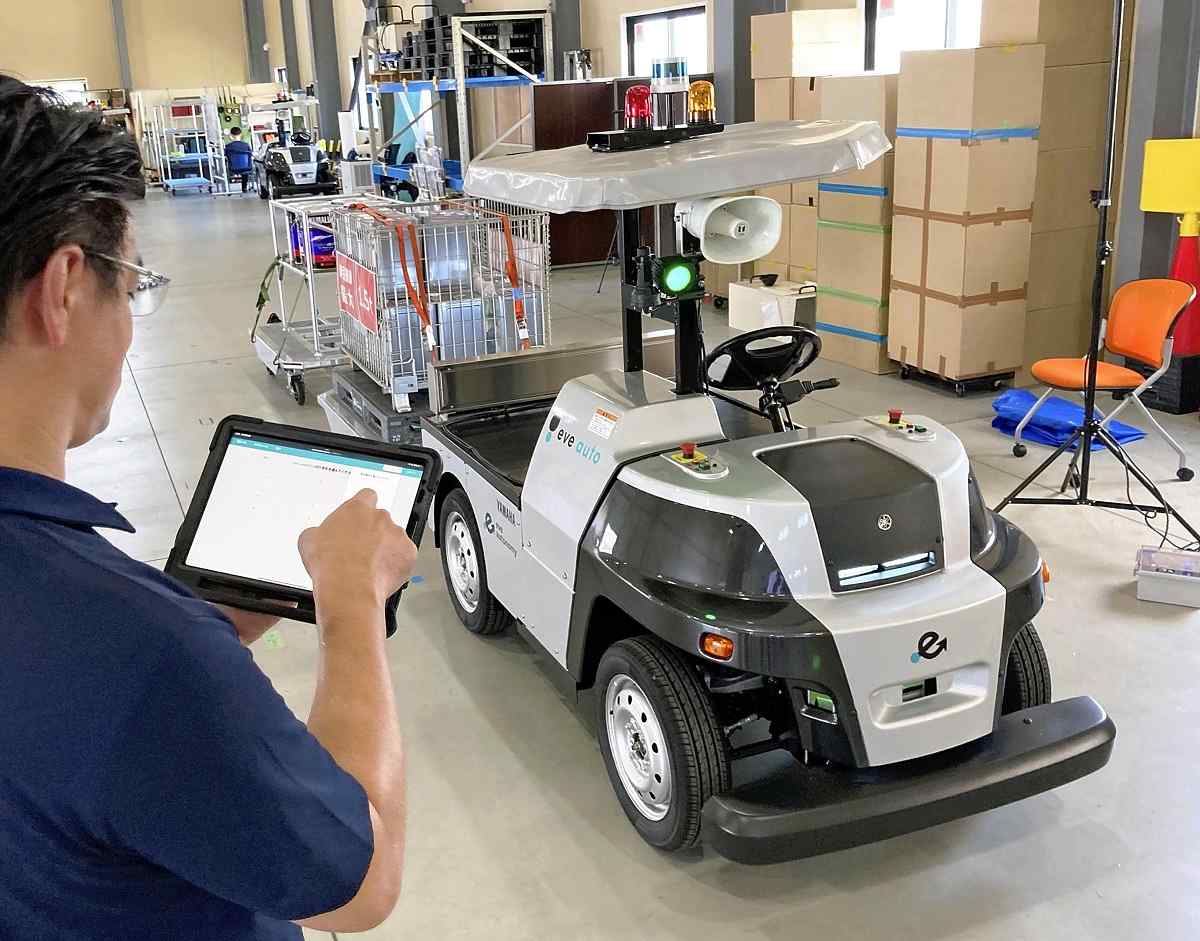Yamaha Motor Subsidiary Unveils Autonomous Transportation Vehicle; Japanese Companies Take Steps in Drive for Unmanned Technology

An autonomous vehicle carries cargo in a demonstration in Iwata, Shizuoka Prefecture, on Wednesday.
15:40 JST, August 22, 2024
A subsidiary of Yamaha Motor Co. on Wednesday unveiled an unmanned transportation vehicle with Level 4 self-driving technology, in which operation of the vehicle is automated in specific conditions.
The company, eve autonomy, Inc., demonstrated the vehicle at its showroom in Iwata, Shizuoka Prefecture.
To create the vehicle, the company reduced the size of Yamaha Motor’s popular electric golf car so that it can be used in confined environments such as inside factories and warehouses.
The vehicle can carry up to 300 kilograms and has a towing capacity of 1.5 tons.
Users can easily map out the vehicle’s route on a tablet device.
The vehicle is available on a monthly subscription, which costs about ¥400,000 per vehicle.
With labor shortages becoming an increasingly serious problem in the logistics industry, expectations are high for autonomous transportation, and the market for them is likely to expand.
“I’d also like to promote this vehicle in countries where labor shortages are getting serious, such as the United States and emerging countries like Thailand. I’m sure it has high growth potential,” said Ryosuke Hoshino, the chief executive officer of eve autonomy.
Various companies are vying with each other to develop autonomous transportation, while eyes are on the technology because of its potential to mitigate labor shortages and reduce labor costs.
In July, Toyota Industries Corp. and All Nippon Airways Co. carried out an experiment on Level 4 autonomous transportation vehicles at Haneda Airport in Tokyo. Suzuki Motor Corp., too, is developing an autonomous delivery robot.
According to Yano Research Institute, the global market for autonomous transportation vehicles and other similar vehicles was ¥401.7 billion in 2022 and is expected to increase by more than double to ¥908.7 billion in 2026.
Top Articles in Business
-

Prudential Life Insurance Plans to Fully Compensate for Damages Caused by Fraudulent Actions Without Waiting for Third-Party Committee Review
-

Narita Airport, Startup in Japan Demonstrate Machine to Compress Clothes for Tourists to Prevent People from Abandoning Suitcases
-

Japan, U.S. Name 3 Inaugural Investment Projects; Reached Agreement After Considerable Difficulty
-

Toyota Motor Group Firm to Sell Clean Energy Greenhouses for Strawberries
-

SoftBank Launches AI Service for Call Centers That Converts Harsh Customer Voices into Softer Voices
JN ACCESS RANKING
-

Japan PM Takaichi’s Cabinet Resigns en Masse
-

Japan Institute to Use Domestic Commercial Optical Lattice Clock to Set Japan Standard Time
-

Israeli Ambassador to Japan Speaks about Japan’s Role in the Reconstruction of Gaza
-

Man Infected with Measles Reportedly Dined at Restaurant in Tokyo Station
-

Videos Plagiarized, Reposted with False Subtitles Claiming ‘Ryukyu Belongs to China’; Anti-China False Information Also Posted in Japan





















